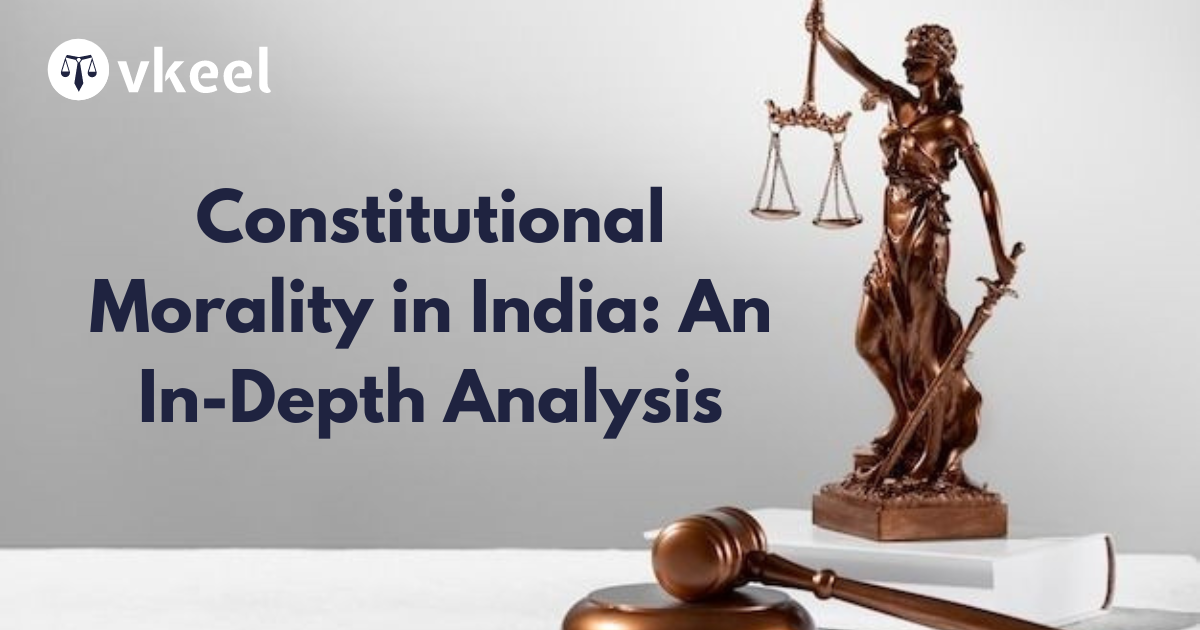Constitutional Morality in India: An In-Depth Analysis
By Himanshu Kumar
Table of Contents
Introduction
Constitutional morality refers to the adherence to the core principles enshrined in the Constitution, guiding the interpretation and application of laws. In India, constitutional morality acts as a beacon, ensuring that the actions of the State and its organs align with the foundational values of democracy, justice, equality, liberty, and fraternity. The concept gained significant attention through various landmark judgments and constitutional amendments, shaping India’s legal and socio-political landscape.
The primary reason for strong constitutional morality in India lies in the foundational vision of the Constitution’s architects, particularly Dr. B.R. Ambedkar. They designed the Constitution to embody the principles of justice, equality, liberty, and fraternity, intending to create a just and inclusive society. This vision is reflected in the Constitution’s provisions, which ensure the protection of fundamental rights, the separation of powers, and the rule of law. By embedding these principles into the constitutional framework, the founders aimed to guide the nation’s governance and societal ethos, fostering a culture of respect for democratic values and human dignity.
Another crucial factor contributing to strong constitutional morality in India is the proactive role played by the judiciary. The Indian Supreme Court and various High Courts have consistently interpreted and enforced constitutional principles through landmark judgments. By invoking constitutional morality in cases related to fundamental rights, social justice, and equality, the judiciary has ensured that the actions of the State and its organs align with the Constitution’s core values. This judicial activism has not only safeguarded individual rights but also reinforced the importance of constitutional morality as a guiding principle in the nation’s legal and political landscape.
Historical Context and Theoretical Framework
The term “constitutional morality” was popularized by Dr. B.R. Ambedkar, the principal architect of the Indian Constitution. Ambedkar envisioned constitutional morality as a means to cultivate respect for the Constitution’s ideals, promoting a culture of rule of law and democratic ethos.
The theoretical framework of constitutional morality involves a deep commitment to the Constitution’s text, spirit, and underlying values. It demands that citizens and institutions operate within the constitutional framework, respecting the balance of power, individual rights, and social justice.
Constitutional Morality and Judicial Interpretation
The judiciary has played a pivotal role in interpreting and enforcing constitutional morality. Various landmark judgments illustrate how the courts have invoked constitutional morality to uphold the Constitution’s core values.
- Kesavananda Bharati v. State of Kerala (1973): This landmark case introduced the Basic Structure Doctrine, asserting that certain fundamental features of the Constitution cannot be altered by any amendment. The Supreme Court emphasized the importance of maintaining the Constitution’s integrity and spirit, a concept intrinsically linked to constitutional morality.
- Navtej Singh Johar v. Union of India (2018): In decriminalizing Section 377 of the Indian Penal Code, which criminalized consensual homosexual acts, the Supreme Court invoked constitutional morality to uphold the rights to equality, dignity, and privacy. The judgment emphasized that societal morality cannot trump constitutional morality, and individual freedoms must be protected against majoritarian impulses.
- Indian Young Lawyers Association v. State of Kerala (2018): Popularly known as the Sabarimala case, the Supreme Court struck down the ban on the entry of women of menstruating age into the Sabarimala temple. The court highlighted that constitutional morality supersedes religious practices that discriminate against individuals based on gender, affirming the principles of equality and non-discrimination.
Constitutional Amendments and Legislative Actions
Several constitutional amendments reflect the evolving understanding of constitutional morality in India.
- The 42nd Amendment (1976): Known as the “Mini-Constitution,” this amendment aimed to strengthen the fabric of Indian democracy by introducing fundamental changes. It emphasized the importance of socialism, secularism, and the integrity of the nation, aligning with the principles of constitutional morality.
- The 86th Amendment (2002): This amendment made education a fundamental right for children aged 6 to 14 years. By inserting Article 21A, the Constitution underscored the State’s commitment to ensuring equal educational opportunities, reflecting the moral obligation to promote social justice and development.
- The 101st Amendment (2016): This amendment introduced the Goods and Services Tax (GST), streamlining the indirect tax system in India. It aimed to create a unified market, promoting economic equality and federal cooperation, aligning with the constitutional values of unity and integrity.
Challenges to Constitutional Morality
Despite its significance, constitutional morality faces several challenges in India.
- Majoritarianism: The rise of majoritarian politics often threatens the principles of constitutional morality. Policies and laws influenced by majoritarian sentiments can undermine individual rights and liberties, as seen in debates over religious freedom, cow protection laws, and freedom of expression.
- Judicial Overreach: While the judiciary plays a crucial role in upholding constitutional morality, instances of judicial overreach can lead to conflicts between different branches of government. Balancing judicial intervention and legislative authority remains a contentious issue.
- Social and Cultural Resistance: Societal norms and traditional beliefs sometimes clash with constitutional values. Resistance to progressive judgments, such as those on LGBTQ+ rights and gender equality, reflects the tension between entrenched societal practices and constitutional morality.
Case Studies Illustrating Constitutional Morality
- Justice K.S. Puttaswamy (Retd.) v. Union of India (2017): In this landmark judgment, the Supreme Court recognized the right to privacy as a fundamental right under the Constitution. The court’s decision was rooted in constitutional morality, emphasizing the protection of individual autonomy and dignity against state intrusion.
- Shayara Bano v. Union of India (2017): The Supreme Court declared the practice of instant triple talaq (talaq-e-biddat) unconstitutional. The judgment was grounded in constitutional morality, asserting that practices violating gender equality and justice cannot be protected under religious freedom.
- Joseph Shine v. Union of India (2018): The Supreme Court decriminalized adultery, striking down Section 497 of the Indian Penal Code. The judgment highlighted that laws discriminating against women and treating them as property violate the principles of constitutional morality, particularly equality and individual dignity.
Promoting Constitutional Morality
Promoting constitutional morality requires concerted efforts from all stakeholders in society.
- Legal Education and Awareness: Enhancing legal literacy and awareness about constitutional values is crucial. Educational institutions, civil society organizations, and the media play a significant role in disseminating knowledge about the Constitution and its moral imperatives.
- Judicial Sensitivity: The judiciary must remain sensitive to the evolving needs and aspirations of society while upholding constitutional morality. Balancing tradition and progress, the courts should interpret laws in a manner that aligns with contemporary values of justice and equality.
- Legislative Responsibility: Legislators must ensure that laws and policies reflect the principles of constitutional morality. Enacting progressive legislation that promotes social justice, protects individual rights, and fosters inclusivity is essential for a just society.
- Public Participation: Active public participation in democratic processes strengthens constitutional morality. Citizens must engage in informed debates, hold representatives accountable, and advocate for policies that uphold constitutional values.
Conclusion
Constitutional morality is the cornerstone of India’s democratic framework, ensuring that the Constitution’s ideals guide the nation’s governance and social ethos. Through landmark judgments and progressive amendments, constitutional morality has evolved, promoting justice, equality, and individual freedoms. However, challenges such as majoritarianism, judicial overreach, and societal resistance necessitate continuous efforts to uphold and strengthen constitutional morality. By fostering legal awareness, judicial sensitivity, legislative responsibility, and public participation, India can continue to evolve as a nation committed to its constitutional values.
Disclaimer:
The information provided in the article is for general informational purposes only, and is not intended to constitute legal advice or to be relied upon as a substitute for legal advice. Furthermore, any information contained in the article is not guaranteed to be current, complete or accurate. If you require legal advice or representation, you should contact an attorney or law firm directly. We are not responsible for any damages resulting from any reliance on the content of this website.










